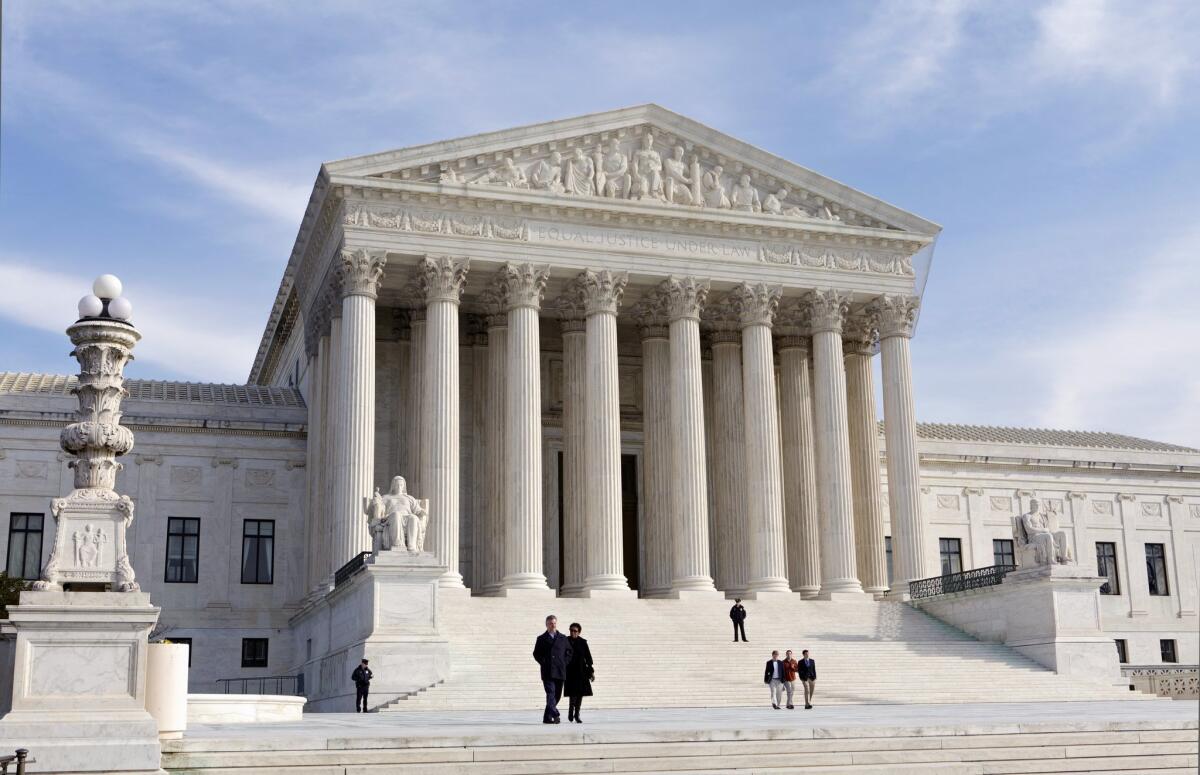Op-Ed: Supreme Court chief justice likely to back healthcare law

- Share via
When the Supreme Court hears oral arguments in King vs. Burwell next week, all eyes will be on Chief Justice John G. Roberts Jr., to try to figure out which way he’s leaning. After all, this case is the latest challenge to the Affordable Care Act, and the last time the law was before the high court, Roberts was the deciding vote in favor of the government. There’s one very good reason to think the chief justice will rule for the government again: He’s too good a lawyer to do otherwise.
King is all about the meaning of the Affordable Care Act, specifically, whether the law makes tax credits to low- and middle-income Americans available to all individuals who qualify based on income, or only to those who live in states with state-run healthcare exchanges. The plaintiffs argue that tax credits aren’t available to individuals who purchase their insurance on exchanges run by the federal government. But it’s difficult to imagine a legal mind like Roberts’ agreeing with an argument as weak as the one the plaintiffs have offered.
Interpreting a statute requires reading it carefully — all of it. You can’t just look at a few words in isolation. As Justice Anthony M. Kennedy wrote in 2006 (in an opinion that Roberts joined), “Interpretation of a word or phrase depends upon reading the whole statutory text, considering the purpose and context of the statute, and consulting any precedents or authorities that inform the analysis.”
When you look at the entire law, it’s clear that tax credits should be available on all exchanges, both state and federal. The statute defines who qualifies for a tax credit based on income level (not state of residence), and it also makes clear that federal exchanges are the functional equivalent of state-run exchanges by requiring that states set up exchanges, but allowing the federal government to set up “such exchange[s]” in their stead if they elect not to.
To now argue otherwise, the plaintiffs in this case rely on just four words in the law — “established by the State” — that appear in the formula for calculating the amount of the credit (not in the provision defining which individuals qualify for it). But a careful reading of the statute shows that those four words are there to make clear that the relevant exchange for calculating the amount of the credit is the exchange in the state where the individual purchased his or her insurance (state-run or not).
This problem is fatal to the plaintiffs’ argument, as the chief justice should surely recognize. But there are other problems with their argument, as has become increasingly clear in the run-up to oral argument. Most significant, the plaintiffs have long maintained that Congress intentionally limited tax credits to encourage states to set up their own exchanges. The members of Congress who led the passage of the law have always said otherwise. As a number of the chairs of the committees that crafted the Affordable Care Act wrote last year, “None of us contemplated that the bill as enacted could be misconstrued to limit financial help only to people in states opting to directly run health insurance marketplaces.”
Indeed, the evidence against the plaintiffs’ case on this point is so strong that in their most recent filing with the Supreme Court, they argue that it is “irrelevant whether Congress subjectively intended” to limit the tax credits. The plaintiffs may hope that these holes in their legal argument don’t matter. But these points should matter to the chief justice and the rest of the court.
There’s already been a great deal of speculation about why Roberts might rule for the government. Some pundits and court watchers have pointed out that a ruling for the plaintiffs in this patently partisan attempt to gut the Affordable Care Act might impair the legitimacy of the court. Others in the legal and business communities have noted that a ruling against the government would result in significant chaos and disruption to insurance markets in the affected states because the tax credits are necessary for the law’s other market reforms to work properly.
These points are both right. But if the chief justice votes for the government, as he should, the reason may be far simpler: He’s too good a lawyer to do otherwise.
Brianne J. Gorod, appellate counsel at the Constitutional Accountability Center, was an author of the brief filed on behalf of some members of Congress and state legislators in King vs. Burwell. Twitter: @BrianneGorod
Follow the Opinion section on Twitter @latimesopinion and Facebook
More to Read
Sign up for Essential California
The most important California stories and recommendations in your inbox every morning.
You may occasionally receive promotional content from the Los Angeles Times.













